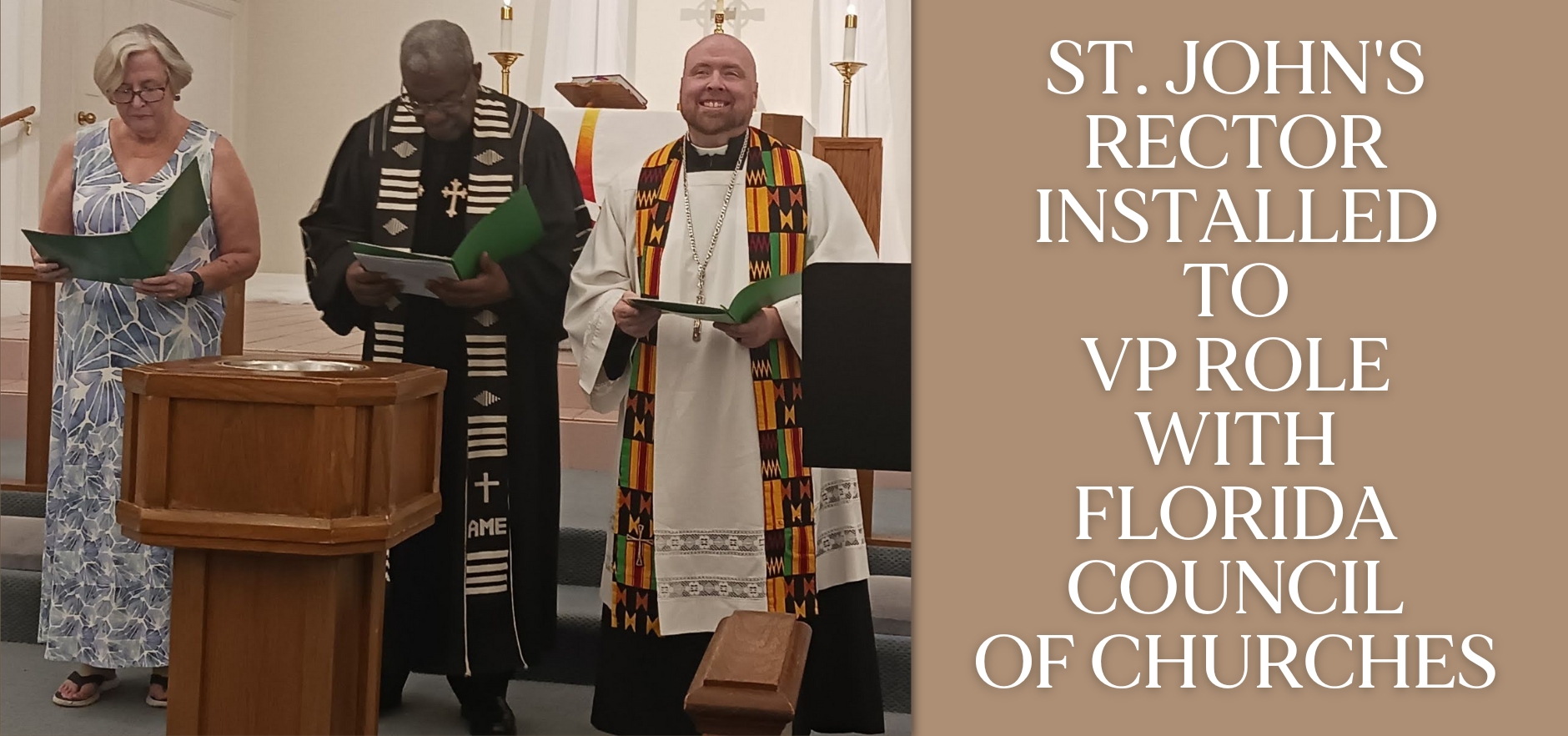
(L-R) Ms. Linda Mack, the Rev. James Golden and the Rev. Charles Myers during their installation service as officers of the FCC | Photo Credit: The Rev. Erika Rembert Smith
Civic activism and community service from a faith-based perspective are more than longstanding priorities for the Rev. Charles Myers, rector of St. John the Baptist, Orlando, and new vice president of the Florida Council of Churches. “They’re rooted in and continuing the legacy of this church,” he said of the dual emphases that also characterize his position with the FCC, which he officially assumed in a service of installation held May 22, 2023, at Salem Lutheran Church, Orlando.
“I always say that we are rooted in civil rights and committed to community rights,” Myers said of his church. “And so we’re just continuing in the 21st century the foundations that were laid in our church in the past, especially with Father Nelson Pinder. (For more on the Rev. Canon Nelson W. Pinder, who died in July 2022, see here and here. For information on the annual Canon Nelson W. Pinder Commemoration Day, see here.) So it’s just a kind of a continuation, gathering people, organizing people around the issues. My work with the FCC is in lockstep with that. It’s just contextualizing it for the 21st century.”
“The Florida Council of Churches is an organization through which member churches and affiliates express their common faith and desire to bring into communion a pluralistic, multifaith, multiethnic and multicultural Florida,” reads the FCC’s description of itself in an invitation to the service. The state fellowship of churches is connected to the World Council of Churches, an ecumenical organization founded in 1948.
Also installed as FCC officers were the Rev. Dr. James T. Morris of the Christian Methodist Episcopal Church, president; the Rev. James T. Golden, Esq., African Methodist Episcopal Church, secretary; and Ms. Linda Mack, Evangelical Lutheran Church in America, treasurer.
“Dr. Morris, who became president, and I have been working together on issues of poverty, housing, living wage and health care,” said Myers, who became rector of St. John the Baptist in 2018. In 2019, he met Morris, who pastors the Carter Tabernacle Christian Methodist Episcopal Church, also in Orlando.
“We developed a friendship, and Dr. Morris was really a mentor to me,” Myers said. “He’s always helped me develop my work and given me many, many tidbits of wisdom.”
Their mutual respect and ability to work together well led directly to Myers’ new role with the FCC, he said. When Morris had the opportunity to become president, he asked the younger man if he would take on the vice presidency.
“Basically, we’re just continuing the work that we were doing; I just get a title now,” Myers said. He compares his role, serving under and assisting Morris, to that of the canon to the ordinary in an Episcopal diocese. Myers will plan FCC worship services, conduct research and assist Morris with contacts and meetings.
“This position opens up connections with churches across Florida,” he said. The FCC, like many churches and parachurch organizations, is still emerging from the COVID era, which gives him the opportunity to help with restructuring and recruiting. “We’re bringing the FCC to the grassroots level,” he said. “It’s kind of a ‘meeting again for the first time’ type thing.”
Myers, who has spent most of his ministry in the Black church, has long been involved with community issues. “Working on Skid Row [in his previous ministry in Los Angeles], I was always involved with the issues,” he said. “Then, coming here, I started getting involved, or people knew of me and said, ‘Hey, can you do this?’ … I look at all of my outreach ministry in the community as an extension of the work that I do at St. John the Baptist, and also to tell the story of our church to a younger generation.”
And a large part of the story of St. John the Baptist, Myers said, is the story of Pinder and his role as both “the people’s priest” and civic activist. “Nobody can ever, ever fill that man’s shoes,” he said of Pinder. “In the season that I’m here, my work is just a humble contribution. It’s for such a time as this; I’m just abiding in my time, in my context.”
